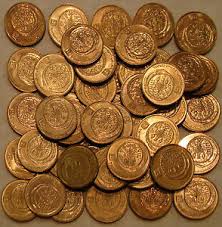Treasurers and Judges of the Temple
First Chronicles 26: 20-32
Treasurers and judges of the Temple DIG: What special service do the Levites offer here? What are these treasuries? What do the other officials do? How do these “last of the Levites” sustain their enthusiasm at a duller task, while others did more colorful pageantry? What job pressures do you think faced Shuba’el when he got to work each day? What character qualities and job skills would be required for excellence in his field? How many officials and judges were required to administer justice outside Jerusalem (First Chronicles 26:27-32 and 23:4)? If these people had lost their genealogical records how would they know who did what?
REFLECT: Did David’s method of hiding his stash give you any hints about what to do with your own jar of coins or boils? What view of the future promotes long-term financial planning by your messianic synagogue or church? What viewpoint retards such interest? What ideas about the future seem to lie behind David’s planning?
David started making the appointments of the Temple officials and judges
several years before the end of his life.

As for the Levites, Ahijah was in charge of the treasuries of the house of God (especially the spoils of war) and the treasuries for the dedicated things (First Chronicles 26:20). The treasuries consisted of the revenues from tithes, offerings, and other sources that were presented to ADONAI by His people (see the commentary on The Life of Christ, to see this link click Je – The Widow’s Offering).
The management of the treasuries of the LORD was the responsibility of the Levites who descended from Gershon (see Es – The Gershonites), the son of Levi, through the line of Ladan (also spelled Libni in Exodus 6:17 and First Chronicles 6:17) and led by the family of Jehieli. His descendants, who were heads of their families, were Jehieli, his sons, Zetham and his brother Joel (First Chronicles 26:21-22).
The Gershonites are followed by the four Kohathite families: the Amramites the Izharites, and Hebronites and the Uzzielites (First Chronicles 26:23). The four names of this verse would seem to stand collectively for that of their father Kohath. One might, under these circumstances, have looked for the name of some member of each of these sub-families to appear in the number of the treasure-keepers just about to be mentioned; but did not happen. Yet among other officials, and before the end of the general subject, the Izharites (verse 29) and the Hebronites (verses 30-31) do appear. This may possibly explain the mapping out thus of the Kohath family.
Shuba’el, then, the Amramite representative through Gershom the elder son of Moses, was the official in charge of the treasuries. Next, through Eliezer, the second son of Moshe, and through Rehabiah, son of Eliezer, we are brought to the four: Jeshaiah, Joram, Zikri and Shelomith, who were four brothers, each a son of Rehabiah (First Chronicles 23:17 and 26:24-25).
A portion of the treasury that had been accumulated through military plunder, and the other special offerings were under the jurisdiction of Shelomith, a descendant of Moshe’s second son Eliezer. He and his four brothers above were in charge of all the treasuries for the things dedicated by King David, by the heads of families who were the commanders of thousands and commanders of hundreds, and by the other army commanders. They opposed anyone who wrongly attempted to enter the Sanctuary and to guard the sacred treasures. Much was expended daily upon the altar: flour, wine, oil, salt, fuel, beside the lamps; quantities were kept on hand, besides the sacred vessels and utensils. Some of the plunder taken in battle they dedicated for the repair of the Temple of the LORD. And everything dedicated by Samuel the seer and by Sha’ul son of Kish, Abner son of Ner and Joab son of Zeruiah, and all the other dedicated things were in the care of Shelomith and his relatives (First Chronicles 26:26-28). It is perhaps somewhat remarkable that, although the sacred history suggests numerous occasions of these dedications, we have no biblical record of them.
From the Izharites: Kenaniah and his sons were assigned duties away from the Temple and even west of the Jordan, as officials and judges over Isra’el. From the Hebronites: Hashabiah and his relatives – seventeen hundred able men – were responsible in Isra’el west of the Jordan for all the work of YHVH and for the king’s service (First Chronicles 26:30). As for the Hebronites, Jeriah was their chief according to the genealogical records of their families. In the fortieth year of David’s reign a search was made in the records, and capable men among the Hebronites were found at Jazer in Gilead (First Chronicles 26:29-31).
Jeriah had twenty-seven hundred relatives, who were able men and heads of families, and King David put them in charge of keeping in touch with the affairs of the Reubenites, the Gadites and the half-tribe of Manasseh for every matter pertaining to God, that is, the all-important religious events of the nation, and for the affairs of the king (First Kings 26:32). Separated from the other tribes, the trans-Jordan Israelites might easily grow carless about observing the annual feasts of even the weekly Shabbats. This is why these officers are listed among the Temple workers. It’s also likely that these officers were responsible for collecting taxes (First Chronicles 26:31).532



Leave A Comment